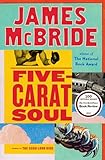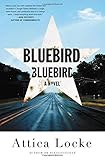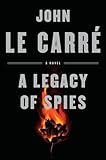We wouldn’t dream of abandoning our vast semi–annual Most Anticipated Book Previews, but we thought a monthly reminder would be helpful (and give us a chance to note titles we missed the first time around). Here’s what we’re looking out for this month. Find more September titles at our Great Second-Half Preview, and let us know what you’re looking forward to in the comments!
 Sing, Unburied, Sing by Jesmyn Ward: Ward returns with her first novel since her National Book Award-winning Salvage the Bones. Ward’s two books between, a memoir (Men We Reaped) and a book of essays she edited (The Fire This Time), deal head-on with racism in America and the woeful ways it’s still deeply embedded in our society. In Sing, Unburied, Sing, Ward’s southern-steeped voice is just as keen and continues to take on the South’s murky history, this time through the young Jojo as he travels with his drug-addicted mother and baby sister as they go to pick up his father just released from prison. (Anne)
Sing, Unburied, Sing by Jesmyn Ward: Ward returns with her first novel since her National Book Award-winning Salvage the Bones. Ward’s two books between, a memoir (Men We Reaped) and a book of essays she edited (The Fire This Time), deal head-on with racism in America and the woeful ways it’s still deeply embedded in our society. In Sing, Unburied, Sing, Ward’s southern-steeped voice is just as keen and continues to take on the South’s murky history, this time through the young Jojo as he travels with his drug-addicted mother and baby sister as they go to pick up his father just released from prison. (Anne)
 Forest Dark by Nicole Krauss: Krauss’s fourth novel follows the lives of two Americans in Israel in alternating chapters. The first character, Jules Epstein, is a recently-divorced, retired lawyer drawn to a rabbi; the second, a novelist named Nicole, is recruited by a mysterious literature professor working on a project about Franz Kafka. Krauss’s novel A History of Love has been rightly praised, but this new book might send people back to her equally intriguing debut, Man Walks into a Room, another investigation of what happens when our lives are radically transformed. (Nick R.)
Forest Dark by Nicole Krauss: Krauss’s fourth novel follows the lives of two Americans in Israel in alternating chapters. The first character, Jules Epstein, is a recently-divorced, retired lawyer drawn to a rabbi; the second, a novelist named Nicole, is recruited by a mysterious literature professor working on a project about Franz Kafka. Krauss’s novel A History of Love has been rightly praised, but this new book might send people back to her equally intriguing debut, Man Walks into a Room, another investigation of what happens when our lives are radically transformed. (Nick R.)
 Little Fires Everywhere by Celeste Ng: With her 2014 debut, Everything I Never Told You, Ng proved she is a powerful storyteller of multifaceted families and the women within them forced to make difficult decisions. Her sophomore effort tangles multiple families in a drama of class and race in a Cleveland suburb. When single mother and artist Mia Warren moves to Shaker Heights, she rents from the well-off Richardson family. Of course, the initial fascination with the Warrens turns sour when they are pitted against the Richardsons in a town rift about a family adopting a Chinese-American child. (Tess)
Little Fires Everywhere by Celeste Ng: With her 2014 debut, Everything I Never Told You, Ng proved she is a powerful storyteller of multifaceted families and the women within them forced to make difficult decisions. Her sophomore effort tangles multiple families in a drama of class and race in a Cleveland suburb. When single mother and artist Mia Warren moves to Shaker Heights, she rents from the well-off Richardson family. Of course, the initial fascination with the Warrens turns sour when they are pitted against the Richardsons in a town rift about a family adopting a Chinese-American child. (Tess)
 Five-Carat Soul by James McBride: McBride returns to fiction for the first time since winning the National Book Award for The Good Lord Bird, his masterly novel about the exploits of the doomed abolitionist John Brown and his entourage. McBride’s new book, Five-Carat Soul, is a collection of stories told through the eyes of an antique toy dealer who makes the score of a lifetime; the poor kids in a neighborhood band called the Five-Carat Soul Bottom Bone Band; a mixed-race child who believes he’s the son of Abraham Lincoln; a boxer; a lion; a doctoral student who uncovers a beautifully complicated war story. Five-Carat Soul will thrill fans of McBride’s unmistakable fictional voice. (Bill)
Five-Carat Soul by James McBride: McBride returns to fiction for the first time since winning the National Book Award for The Good Lord Bird, his masterly novel about the exploits of the doomed abolitionist John Brown and his entourage. McBride’s new book, Five-Carat Soul, is a collection of stories told through the eyes of an antique toy dealer who makes the score of a lifetime; the poor kids in a neighborhood band called the Five-Carat Soul Bottom Bone Band; a mixed-race child who believes he’s the son of Abraham Lincoln; a boxer; a lion; a doctoral student who uncovers a beautifully complicated war story. Five-Carat Soul will thrill fans of McBride’s unmistakable fictional voice. (Bill)
 Dinner at the Center of the Earth by Nathan Englander: Though the latest by Englander takes place on three different continents, at heart it’s a novel about the conflicts of modern Israel. Z, or rather Prisoner Z, has been held at a black site in the desert for close to 12 years, where the only company he’s allowed is a single guard. The one official who knows about him is a comatose figure named The General. Through a series of flashbacks, we learn who Z really is: an American operative who compromised Israeli state secrets. (Thom)
Dinner at the Center of the Earth by Nathan Englander: Though the latest by Englander takes place on three different continents, at heart it’s a novel about the conflicts of modern Israel. Z, or rather Prisoner Z, has been held at a black site in the desert for close to 12 years, where the only company he’s allowed is a single guard. The one official who knows about him is a comatose figure named The General. Through a series of flashbacks, we learn who Z really is: an American operative who compromised Israeli state secrets. (Thom)
 Katalin Street by Magda Szabó (translated by Len Rix): Why does writing this vivid take so long to find its way West? Equal parts lament, paean, and family saga, Szabó’s 1969 novel (and 2007 Prix Cévennes winner) in Len Rix’s legato English translation captures handily the “double tragedy of eastern Europe”—razed by Nazis and rebuilt by Communists. The unquiet spirits of post-war Budapest put meat on the bones of the Soviet joke that “only the past is unpredictable,” and one less-than-silent witness of the sins and slights of a shattered community harbors no illusions about permitting the living to exist peaceably in the soft-focus sentimentality of their survival. (Il’ja)
Katalin Street by Magda Szabó (translated by Len Rix): Why does writing this vivid take so long to find its way West? Equal parts lament, paean, and family saga, Szabó’s 1969 novel (and 2007 Prix Cévennes winner) in Len Rix’s legato English translation captures handily the “double tragedy of eastern Europe”—razed by Nazis and rebuilt by Communists. The unquiet spirits of post-war Budapest put meat on the bones of the Soviet joke that “only the past is unpredictable,” and one less-than-silent witness of the sins and slights of a shattered community harbors no illusions about permitting the living to exist peaceably in the soft-focus sentimentality of their survival. (Il’ja)
 Letters to Memory by Karen Tei Yamashita: The author of Brazil-Maru, Through the Arc of the Rain Forest, and Tropic of Orange mines her family’s history with archival materials from a Japanese internment camp, creating a hybrid work of fiction, nonfiction, and memoir that features recreated correspondence between composite characters from a range of academic disciplines. (Lydia)
Letters to Memory by Karen Tei Yamashita: The author of Brazil-Maru, Through the Arc of the Rain Forest, and Tropic of Orange mines her family’s history with archival materials from a Japanese internment camp, creating a hybrid work of fiction, nonfiction, and memoir that features recreated correspondence between composite characters from a range of academic disciplines. (Lydia)
 Sourdough by Robin Sloan: If Mr. Penumbra’s 24-Hour Bookstore was any indication, Sloan has a knack for putting the weird and wonderful back into the tech world. Protagonist Lois Clary is a San Francisco software engineer who find herself given the responsibility of keeping a secret sourdough starter alive. The addled coder soon turns into the most sought-after baker in the Bay Area, ruffling a few industry feathers along the way, until she’s invited to join an emerging food and tech scene. It all sounds too wacky to be good, but Sloan’s signature humor makes it a promising second novel. (Tess)
Sourdough by Robin Sloan: If Mr. Penumbra’s 24-Hour Bookstore was any indication, Sloan has a knack for putting the weird and wonderful back into the tech world. Protagonist Lois Clary is a San Francisco software engineer who find herself given the responsibility of keeping a secret sourdough starter alive. The addled coder soon turns into the most sought-after baker in the Bay Area, ruffling a few industry feathers along the way, until she’s invited to join an emerging food and tech scene. It all sounds too wacky to be good, but Sloan’s signature humor makes it a promising second novel. (Tess)
 Bluebird, Bluebird by Attica Locke: I heard Locke—award-winning author of Pleasantville, a writer on Fox’s Empire, and a native of Texas—say that she wanted to write something about the black experience in the South that wasn’t only about prejudice, but showed that complexity and love and joy exist even in oppressive systems. I may be paraphrasing poorly, but I’m excited to read her book, which is about a black Texas Ranger trying to solve the murders of a black lawyer from Chicago and a local white woman. (Janet)
Bluebird, Bluebird by Attica Locke: I heard Locke—award-winning author of Pleasantville, a writer on Fox’s Empire, and a native of Texas—say that she wanted to write something about the black experience in the South that wasn’t only about prejudice, but showed that complexity and love and joy exist even in oppressive systems. I may be paraphrasing poorly, but I’m excited to read her book, which is about a black Texas Ranger trying to solve the murders of a black lawyer from Chicago and a local white woman. (Janet)
 Affections by Rodrigo Hasbún (translated by Sophie Hughes): A work of historical fiction based on the life and family of Hans Ertl, cameraman to Leni Riefenstahl and photographer of Rommel, who settles in Bolivia after the war. The novel is set in the 1950s and 60s, and follows Ertl and his children on a disastrous mission into the Amazon. Kirkus calls it “A one-sitting tale of fragmented relationships with a broad scope, delivered with grace and power.” (Lydia)
Affections by Rodrigo Hasbún (translated by Sophie Hughes): A work of historical fiction based on the life and family of Hans Ertl, cameraman to Leni Riefenstahl and photographer of Rommel, who settles in Bolivia after the war. The novel is set in the 1950s and 60s, and follows Ertl and his children on a disastrous mission into the Amazon. Kirkus calls it “A one-sitting tale of fragmented relationships with a broad scope, delivered with grace and power.” (Lydia)
 A Loving, Faithful Animal by Josephine Rowe: Rowe’s two previous books—How a Moth Becomes a Boat and Tarcutta Wake—were collections that walked the line between short fiction and prose poetry. A Loving, Faithful Animal, her exquisite first novel, is concerned with the long shadow of war across generations. Rowe tells the story of a fractured family in 1990s Australia after the father, a Vietnam War veteran, leaves home. (Emily)
A Loving, Faithful Animal by Josephine Rowe: Rowe’s two previous books—How a Moth Becomes a Boat and Tarcutta Wake—were collections that walked the line between short fiction and prose poetry. A Loving, Faithful Animal, her exquisite first novel, is concerned with the long shadow of war across generations. Rowe tells the story of a fractured family in 1990s Australia after the father, a Vietnam War veteran, leaves home. (Emily)
 After the Flare by Deji Bryce Olukotun: The sequel to Nigerians in Space, the afrofuturist novel The Guardian described as “an exquisite blend of unpredictable twists and lightening-speed plot.” After the Flare finds the world plunged into chaos following a devastating solar storm, after which only the Nigerian space program is functional. A group of scientists have to contend with looming space disaster and Boko Haram in a sequel that a starred Kirkus reviews calls “spectacularly imagined.” (Lydia)
After the Flare by Deji Bryce Olukotun: The sequel to Nigerians in Space, the afrofuturist novel The Guardian described as “an exquisite blend of unpredictable twists and lightening-speed plot.” After the Flare finds the world plunged into chaos following a devastating solar storm, after which only the Nigerian space program is functional. A group of scientists have to contend with looming space disaster and Boko Haram in a sequel that a starred Kirkus reviews calls “spectacularly imagined.” (Lydia)
 Go, Went, Gone by Jenny Erpenbeck (translated by Susan Bernofsky): German author Erpenbeck’s fiction takes deep root in personal history. To research her first novel she re-enrolled in high school. Visitation followed the history of a piece of land in her family, as it was divided and passed between past owners, as a lens for looking at the travails faced during WWII. With Go, Went, Gone Erpenbeck turns to the current refugee crisis—in the book a retired professor becomes involved assisting refugees and spends his evenings documenting their stories. Erpenbeck’s own work with refugees inspired the stories woven into her narrative; “the fusion of the found and the invented yields an indistinguishable amalgam,” according to the Goethe Institute. (Anne)
Go, Went, Gone by Jenny Erpenbeck (translated by Susan Bernofsky): German author Erpenbeck’s fiction takes deep root in personal history. To research her first novel she re-enrolled in high school. Visitation followed the history of a piece of land in her family, as it was divided and passed between past owners, as a lens for looking at the travails faced during WWII. With Go, Went, Gone Erpenbeck turns to the current refugee crisis—in the book a retired professor becomes involved assisting refugees and spends his evenings documenting their stories. Erpenbeck’s own work with refugees inspired the stories woven into her narrative; “the fusion of the found and the invented yields an indistinguishable amalgam,” according to the Goethe Institute. (Anne)
 Border by Kapka Kassabova: When Kassabova was a child growing up in Iron Curtain-era Bulgaria, the country’s isolated southern borderland—where Bulgaria meets Turkey and Greece—was rumored to be a relatively easy crossing point into the West, and so the region swarmed with migrants, soldiers, and spies. In Border, a work of narrative reportage, Kassabova returns to a region whose natural beauty is matched only by the complexity of its political and cultural landscapes: the Communist-era spies have long since departed, but the borderland, Mark Mazower wrote recently in The Guardian, remains “an environment that does not spare the unlucky or the vulnerable.” (Emily)
Border by Kapka Kassabova: When Kassabova was a child growing up in Iron Curtain-era Bulgaria, the country’s isolated southern borderland—where Bulgaria meets Turkey and Greece—was rumored to be a relatively easy crossing point into the West, and so the region swarmed with migrants, soldiers, and spies. In Border, a work of narrative reportage, Kassabova returns to a region whose natural beauty is matched only by the complexity of its political and cultural landscapes: the Communist-era spies have long since departed, but the borderland, Mark Mazower wrote recently in The Guardian, remains “an environment that does not spare the unlucky or the vulnerable.” (Emily)
 A Legacy of Spies by John le Carré: The first George Smiley novel in a quarter of a century, from the master of spy fiction. Enough said. (Lydia)
A Legacy of Spies by John le Carré: The first George Smiley novel in a quarter of a century, from the master of spy fiction. Enough said. (Lydia)








